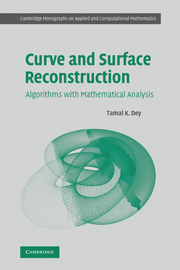7 - Noisy Samples
Published online by Cambridge University Press: 20 August 2009
Summary
In the previous chapters we have assumed that the input points lie exactly on the sampled surface. Unfortunately, in practice, the input sample often does not satisfy this constraint. Noise introduced by measurement errors scatters the sample points away from the surface. Consequently, all analysis as presented in the previous chapters becomes invalid for such input points. In this chapter we develop a noise model that accounts for the scatter of the inputs and then analyze noisy samples based on this model. We will see that, as in the noise-free case, some key properties of the sampled surface can be computed from the Delaunay triangulation of a noisy sample. Specifically, we show that normals of the sampled surface can still be estimated from the Delaunay/Voronoi diagrams. Furthermore, the medial axis and hence the local feature sizes of the sampled surface can also be estimated from these diagrams. These results will be used in Chapters 8 and 9 where we present algorithms to reconstruct surfaces from noisy samples.
Noise Model
In the noise-free case ε-sampling requires each point on the surface have a sample point within a distance of ε times the local feature size. When noise is allowed, the sample points need not lie exactly on the surface and may scatter around it.
- Type
- Chapter
- Information
- Curve and Surface ReconstructionAlgorithms with Mathematical Analysis, pp. 113 - 132Publisher: Cambridge University PressPrint publication year: 2006

